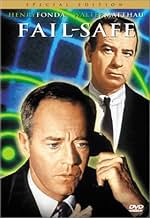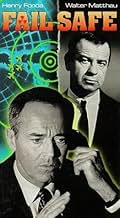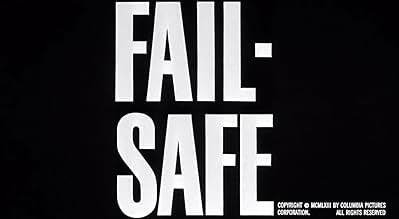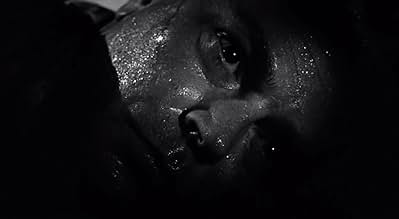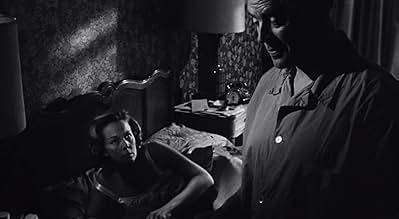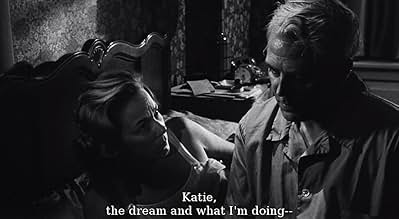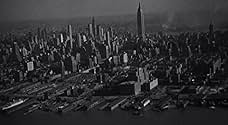IMDb-BEWERTUNG
8,0/10
26.537
IHRE BEWERTUNG
Aufgrund eines technischen Fehlers erhalten amerikanische Flugzeuggeschwader den Befehl, über Moskau Atombomben abzuwerfen. Kann ein absoluter Vernichtungskrieg abgewendet werden?Aufgrund eines technischen Fehlers erhalten amerikanische Flugzeuggeschwader den Befehl, über Moskau Atombomben abzuwerfen. Kann ein absoluter Vernichtungskrieg abgewendet werden?Aufgrund eines technischen Fehlers erhalten amerikanische Flugzeuggeschwader den Befehl, über Moskau Atombomben abzuwerfen. Kann ein absoluter Vernichtungskrieg abgewendet werden?
- Nominiert für 1 BAFTA Award
- 3 Nominierungen insgesamt
Dom DeLuise
- Sgt. Collins
- (as Dom DeLouise)
Empfohlene Bewertungen
22 January 2010. Even in black and white, this edgy, raw and gripping nuclear apocalyptic thriller retains is powerful and emotional message even after 46 years. Even though some of the equipment is dated in this movie, the serious and almost seemingly electronic starkness is able to project a impressive, compelling impression of sophistication that maintains a level of captivating images that breath intelligence and innovation of government operations even years ago. The acting and substance of this thriller contains a constant level of tension, off-balance conflict that hits home even today. While almost deviating, particularly in the beginning to the dated acting dramatics of the 60s, this movie successful keeps its attention on seemingly realistic and heightened elements of military and political strategy, operations and equipment, tactics that all fit well together making the entire movie a unified and seamless experience in accidental tragedy. 9/10.
I'm a child of the 1970s, but this movie still scared me. You didn't have to grow up during the 50s or 60s to appreciate this. Anways in the 1980s, when Reagan was in office, nuclear war seemed a very real prospect. This movie is deadly serious, NO humor at all, and lit very sparsely. The battles between Russian and US planes seen as blips on a huge screen, is just as scary as if we had seen it realistically. Frightening, harrowing...hard to believe this film still has that effect now. Well worth watching but it's very very grim. Also, Fonda is superb as the President.
I saw this movie via two instances of serendipity. First I just happened to be living in an area that offered The Disney Channel in the basic cable package (which is all I ever get) and that as a Bruce Springsteen fan I was excited that the Disney Channel was going to broadcast a special concert short on The Boss. Of course I'm an older Springsteen fan, so instead of staying up late to watch it I just put a tape in and pressed record. The next day I enjoyed the concert, but forgot to hit stop when it ended. What followed next was "Fail Safe". After a few minutes it caught my interest, and now is one of my favorite films.
I'm not sure if this was a precursor to "Strangelove" or vice versa, for they are both listed as 1964 releases. Oddly they both have the same texture about them which leads me to believe that there was more than coincidence in their respective productions. Both are piece de resistances in Cold War studies. The main sundering is that where "Strangelove" excels in parody, "Fail Safe" is rich in tension.
Of course an anxious film about nuclear war on the brink can easily invoke tension (remember "War Games"?), but this film exceeds a good plot. The filmmakers use a backdrop of soceital depravity to create neurasthenia and presentiment; as shown by the strange and erotic scene with Walter Matthau and the woman in the car (kind of a mass-sadisim, lust thing) and the implied domestic violence in the apartment scene. The movie is also deliciously philosophical (the clever "criminals and file clerks will survive" theory) as well as adroit phsycological character development for all the main characters.
The picture is also darkly filmed, remarkedly minimalist and low-budget as if to show the limits of technology, in order to symbolize the sophistry of our trust in it. BTW I love the Matthau character's (the political science professor) line as he explains the faults of missles that have no human intuition. "The rockets have the defect of their virtues" he says in explaining how they cannot make a conscious decision to abort after receiving an order. But the message in this film is clear; even if technology breaks down it is only a symptom of our doom, ultimately it is humans who are responsible.
I'm not sure if this was a precursor to "Strangelove" or vice versa, for they are both listed as 1964 releases. Oddly they both have the same texture about them which leads me to believe that there was more than coincidence in their respective productions. Both are piece de resistances in Cold War studies. The main sundering is that where "Strangelove" excels in parody, "Fail Safe" is rich in tension.
Of course an anxious film about nuclear war on the brink can easily invoke tension (remember "War Games"?), but this film exceeds a good plot. The filmmakers use a backdrop of soceital depravity to create neurasthenia and presentiment; as shown by the strange and erotic scene with Walter Matthau and the woman in the car (kind of a mass-sadisim, lust thing) and the implied domestic violence in the apartment scene. The movie is also deliciously philosophical (the clever "criminals and file clerks will survive" theory) as well as adroit phsycological character development for all the main characters.
The picture is also darkly filmed, remarkedly minimalist and low-budget as if to show the limits of technology, in order to symbolize the sophistry of our trust in it. BTW I love the Matthau character's (the political science professor) line as he explains the faults of missles that have no human intuition. "The rockets have the defect of their virtues" he says in explaining how they cannot make a conscious decision to abort after receiving an order. But the message in this film is clear; even if technology breaks down it is only a symptom of our doom, ultimately it is humans who are responsible.
See "Fail- Safe."
I couldn't sleep without the light on after I saw this fantastically fabricated film. When a machine malfunctions and signals a U.S bomber to drop atomic missiles over Moscow, the Soviet Premier and the U.S President struggle to save the world from nuclear holocaust. The last three minutes are among the most powerful I've seen in a movie.
I couldn't sleep without the light on after I saw this fantastically fabricated film. When a machine malfunctions and signals a U.S bomber to drop atomic missiles over Moscow, the Soviet Premier and the U.S President struggle to save the world from nuclear holocaust. The last three minutes are among the most powerful I've seen in a movie.
I was thoroughly in suspense throughout this magnificent film. I almost felt as if I was watching World War III unfurl like the Gulf War did on CNN, it was that convincing. Fonda as the President and Matthau as the Professor, in truly memorable performances, are superb in their roles and indeed the entire cast is strongly competent. Besides the unforgettable ending, by way of the President's unthinkable concession, are the arguments and attitudes of the Professor and Colonel Cascio. At the time it must have been very tempting to many hawks in Cold War administrations to end the deadlock whenever a seemingly decisive opening presented itself. I strongly recommend this film for its believablity and realism and even the final credits! 10/10.
Wusstest du schon
- WissenswertesThe "computer-generated" image on the control-room screen (including the map of the world, the planes and the explosions) was entirely drawn and animated by hand.
- PatzerThe interior shots of the bombers, Convair B-58 Hustlers (see Trivia), actually were shot inside of a commercial airline simulator then under repair at a a New York airport. The three crew members sit within feet of each other, in an open cockpit layout. In an actual B-58, the world's first fly-by-wire and supersonic bomber (and capable of twice the speed of sound), the three-man crew of pilot, bombardier/navigator, and defense systems specialist were seated in-line and had no physical contact with one another. To make survivable ejection possible on such a high-speed aircraft, each compartment was specifically designed as wholly contained clam-shell "pod" that would be ejected intact if the need arose. As a result, the crew had to rely on an internal telecommunications system to talk, or a string-and-pulley system that ran along the cabin wall to exchange notes if those systems failed. It's speculated that this pod design was incorporated as a presidential safeguard on modern 747 versions of Air Force One, as implied in the film Air Force One (1997).
- Zitate
US Ambassador: [over the phone] I can hear the sound of explosions from the north east. The sky is very bright. All lit up.
[phone melts and high pitched whining sound starts]
- Crazy Credits[FINAL CREDIT]: The producers of this film wish to stress that it is the stated position of the Department of Defense and the United States Air Force that a rigidly enforced system of safeguards and controls insure that occurrences such as those depicted in this story cannot happen
- VerbindungenFeatured in Henry Fonda: The Man and His Movies (1982)
Top-Auswahl
Melde dich zum Bewerten an und greife auf die Watchlist für personalisierte Empfehlungen zu.
Details
- Erscheinungsdatum
- Herkunftsland
- Sprachen
- Auch bekannt als
- Límite de seguridad
- Drehorte
- Westbury, Long Island, New York, USA(Roosevelt Field: President's bunker)
- Produktionsfirma
- Weitere beteiligte Unternehmen bei IMDbPro anzeigen
Box Office
- Bruttoertrag in den USA und Kanada
- 3.924.000 $
- Laufzeit
- 1 Std. 52 Min.(112 min)
- Farbe
- Seitenverhältnis
- 1.85 : 1
Zu dieser Seite beitragen
Bearbeitung vorschlagen oder fehlenden Inhalt hinzufügen

![Trailer [OV] ansehen](https://m.media-amazon.com/images/M/MV5BZjExYTg4YzctNGIwZC00ZWUwLWFhOWItNTJhYjRiY2UzZjk4XkEyXkFqcGdeQXRyYW5zY29kZS13b3JrZmxvdw@@._V1_QL75_UX500_CR0)
